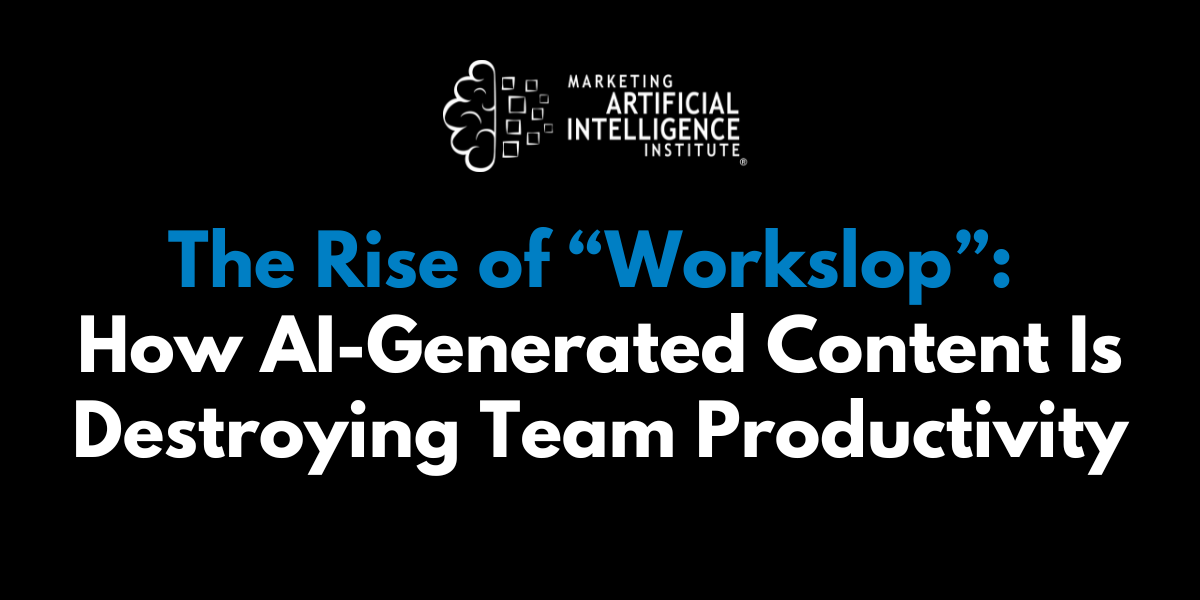Generative AI was supposed to supercharge productivity. Instead, many companies are grappling with something that researchers are calling “workslop,” or AI-generated output that looks polished but actually creates more work.
According to new research from BetterUp Labs and Stanford Social Media Lab, workslop is defined as AI-generated work content that masquerades as good work but lacks the substance to meaningfully advance a given task. In short, it’s high-polish, low-effort work that offloads the cognitive burden from the creator to the receiver.
To understand how this pervasive problem is gumming up the works at companies everywhere, I spoke to SmarterX and Marketing AI Institute founder and CEO Paul Roetzer on Episode 170 of The Artificial Intelligence Show.
The Hidden Tax of AI-Generated Slop
The core issue with workslop is that it shifts the effort downstream. An employee can quickly generate a lengthy report or a set of well-formatted slides, but if the output is missing crucial context, is incomplete, or is flat-out unhelpful, the person who receives it has to decode, correct, or simply redo the work.
Roetzer noted that this problem is unique to modern generative AI. We use other tech tools like Google all the time to speed up our work. But, by producing workslop with AI, we’re actually using a machine to offload the cognitive heavy lifting to another human being later down the line.
The costs are material. The research shows that employees spend an average of one hour and 56 minutes dealing with each instance of workslop. When applied to a large organization, this "workslop tax" can translate to more than $9 million per year in lost productivity for a company of 10,000 workers.
But the costs aren't just monetary. Workslop is taking a social and emotional toll. According to the research:
“What’s more, 34% of people who receive workslop are notifying teammates or managers of these incidents, potentially eroding trust between sender and receiver. One third of people (32%) who have received workslop report being less likely to want to work with the sender again in the future.”
Not to mention, when an employee receives low-effort, unhelpful AI output, approximately half of people view that colleague as less creative, capable, and reliable than they did before.
AI Literacy Is Key to Combatting Workslop
How are smart, capable teams falling into this trap? Roetzer believes the problem often begins at the top.
The research shows that when organizational leaders mandate “AI everywhere all the time,” they model a lack of discernment in how to apply the technology. This translates directly to employees thoughtlessly copying and pasting AI-generated text into documents, even when the AI isn’t suited for the task at hand.
“A theme we talk about all the time is responsible AI training and approaching AI as a change management project, not just a tech project,” says Roetzer. “Everybody just gets the tools and you don’t think about actually teaching employees how to use the tools in a responsible way.”
Workslop is a profound new challenge brought on by AI, and Roetzer thinks that unfortunately it will soon be prevalent everywhere. However, the moral of the story here, he says, is simple: Do not allow yourself or your team to use AI as a replacement for critical thinking.
“Friends don’t let friends produce workslop.”
Mike Kaput
Mike Kaput is the Chief Content Officer at SmarterX and a leading voice on the application of AI in business. He is the co-author of Marketing Artificial Intelligence and co-host of The Artificial Intelligence Show podcast.


